
Global pharmaceutical company Merck (NYSE:MRK) met Wall Street’s revenue expectations in Q2 CY2025, but sales fell by 1.9% year on year to $15.81 billion. The company’s outlook for the full year was close to analysts’ estimates with revenue guided to $64.8 billion at the midpoint. Its non-GAAP profit of $2.13 per share was 5% above analysts’ consensus estimates.
Is now the time to buy Merck? Find out by accessing our full research report, it’s free.
Merck (MRK) Q2 CY2025 Highlights:
- Revenue: $15.81 billion vs analyst estimates of $15.75 billion (1.9% year-on-year decline, in line)
- Adjusted EPS: $2.13 vs analyst estimates of $2.03 (5% beat)
- The company reconfirmed its revenue guidance for the full year of $64.8 billion at the midpoint
- Adjusted EPS guidance for the full year is $8.92 at the midpoint, beating analyst estimates by 0.6%
- Operating Margin: 31.6%, down from 37.5% in the same quarter last year
- Constant Currency Revenue fell 2% year on year (11% in the same quarter last year)
- Market Capitalization: $211.1 billion
"Earlier this month, we were pleased to announce our pending acquisition of Verona Pharma, which augments our portfolio and pipeline and is another example of acting decisively when science and value align,” said Robert M. Davis, chairman and chief executive officer.
Company Overview
With roots dating back to 1891 and a portfolio that includes the blockbuster cancer immunotherapy Keytruda, Merck (NYSE:MRK) develops and sells prescription medicines, vaccines, and animal health products across oncology, infectious diseases, cardiovascular, and other therapeutic areas.
Revenue Growth
Reviewing a company’s long-term sales performance reveals insights into its quality. Any business can have short-term success, but a top-tier one grows for years. Regrettably, Merck’s sales grew at a mediocre 6.9% compounded annual growth rate over the last five years. This wasn’t a great result compared to the rest of the healthcare sector, but there are still things to like about Merck.
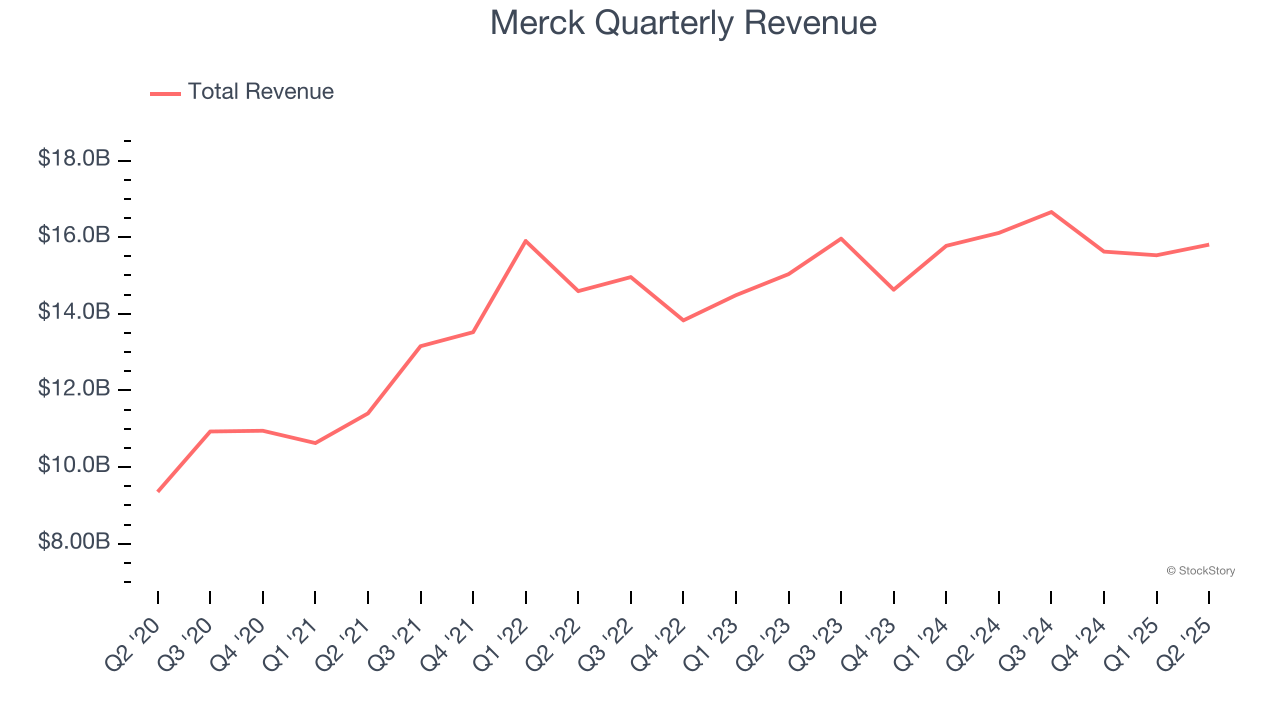
Long-term growth is the most important, but within healthcare, a half-decade historical view may miss new innovations or demand cycles. Merck’s recent performance shows its demand has slowed as its annualized revenue growth of 4.4% over the last two years was below its five-year trend. 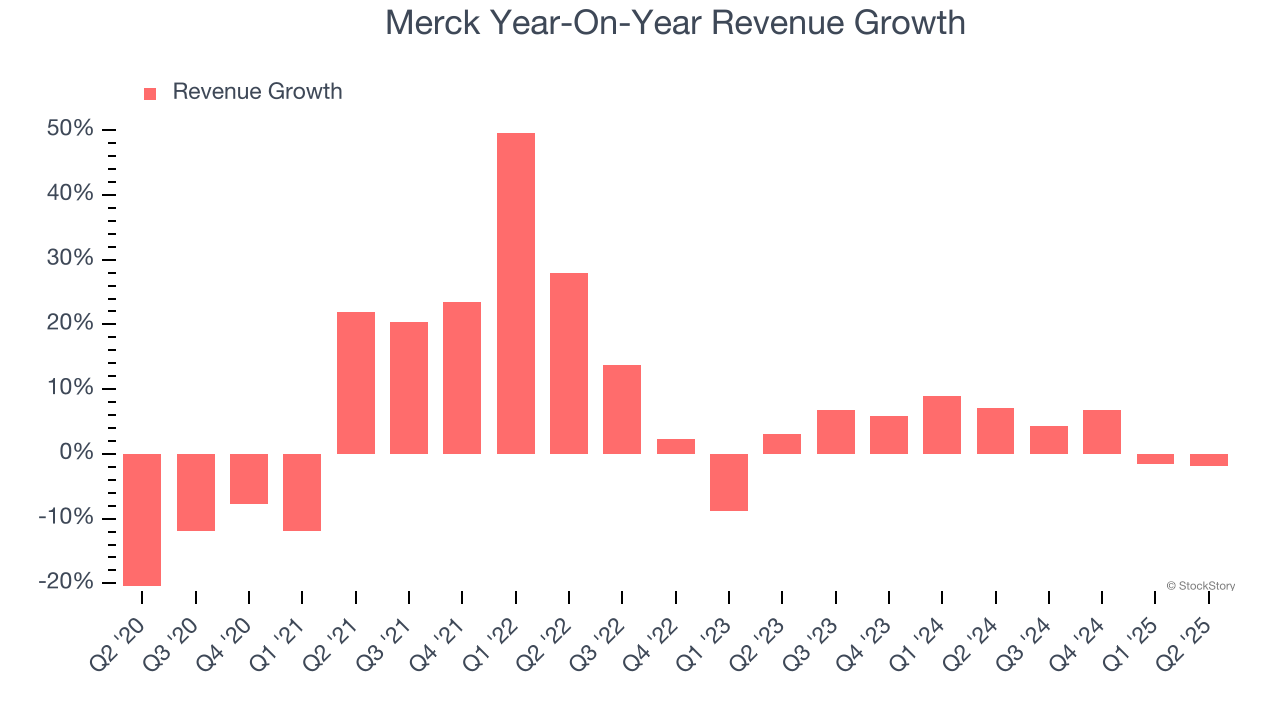
We can better understand the company’s sales dynamics by analyzing its constant currency revenue, which excludes currency movements that are outside their control and not indicative of demand. Over the last two years, its constant currency sales averaged 6.8% year-on-year growth. Because this number is better than its normal revenue growth, we can see that foreign exchange rates have been a headwind for Merck. 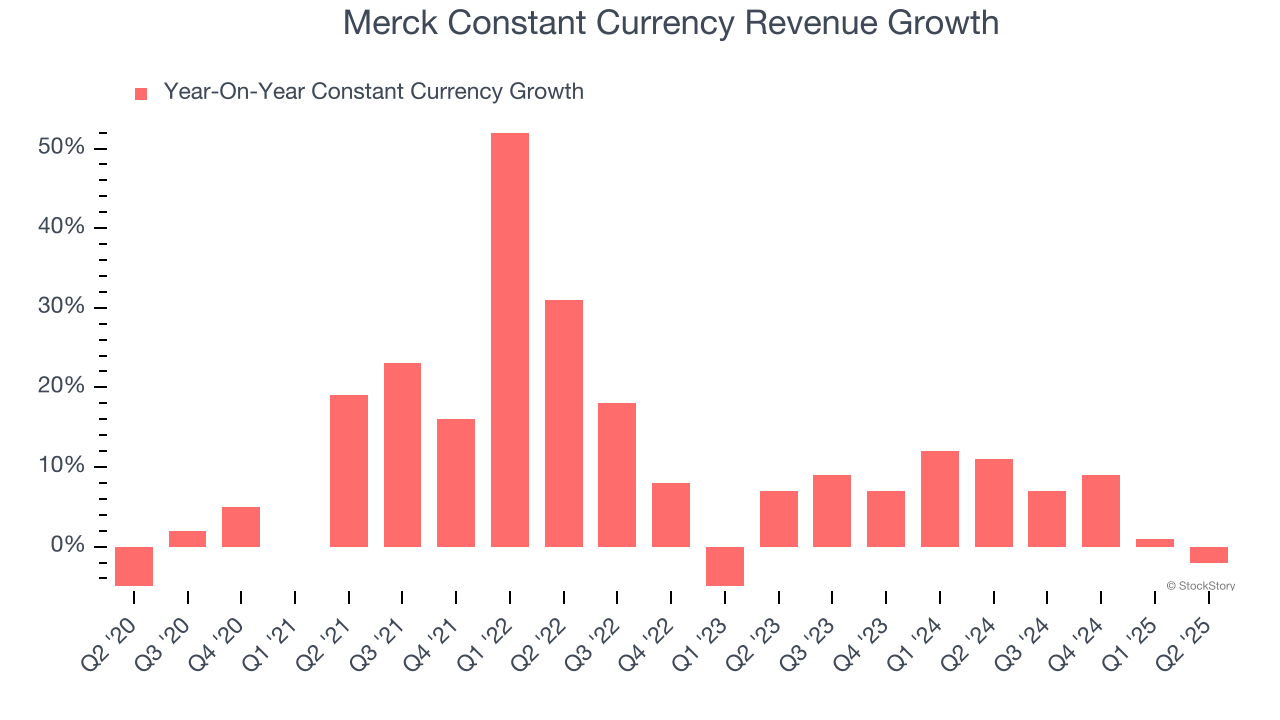
This quarter, Merck reported a rather uninspiring 1.9% year-on-year revenue decline to $15.81 billion of revenue, in line with Wall Street’s estimates.
Looking ahead, sell-side analysts expect revenue to grow 4.3% over the next 12 months, similar to its two-year rate. This projection is underwhelming and suggests its newer products and services will not lead to better top-line performance yet. At least the company is tracking well in other measures of financial health.
Here at StockStory, we certainly understand the potential of thematic investing. Diverse winners from Microsoft (MSFT) to Alphabet (GOOG), Coca-Cola (KO) to Monster Beverage (MNST) could all have been identified as promising growth stories with a megatrend driving the growth. So, in that spirit, we’ve identified a relatively under-the-radar profitable growth stock benefiting from the rise of AI, available to you FREE via this link.
Operating Margin
Operating margin is one of the best measures of profitability because it tells us how much money a company takes home after subtracting all core expenses, like marketing and R&D.
Merck has been an efficient company over the last five years. It was one of the more profitable businesses in the healthcare sector, boasting an average operating margin of 23.4%.
Analyzing the trend in its profitability, Merck’s operating margin rose by 13.3 percentage points over the last five years, as its sales growth gave it operating leverage. This performance was mostly driven by its recent improvements as the company’s margin has increased by 19.7 percentage points on a two-year basis.
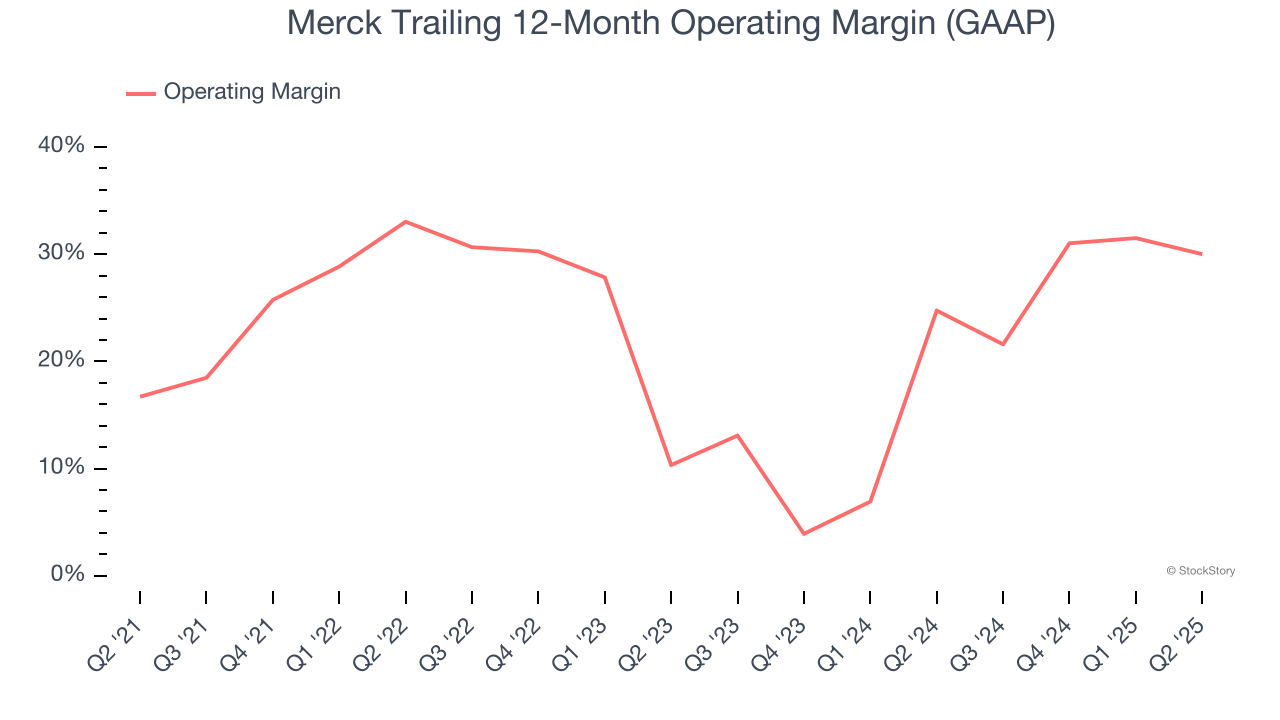
In Q2, Merck generated an operating margin profit margin of 31.6%, down 5.9 percentage points year on year. This contraction shows it was less efficient because its expenses increased relative to its revenue.
Earnings Per Share
We track the long-term change in earnings per share (EPS) for the same reason as long-term revenue growth. Compared to revenue, however, EPS highlights whether a company’s growth is profitable.
Merck’s EPS grew at a remarkable 9.5% compounded annual growth rate over the last five years, higher than its 6.9% annualized revenue growth. This tells us the company became more profitable on a per-share basis as it expanded.
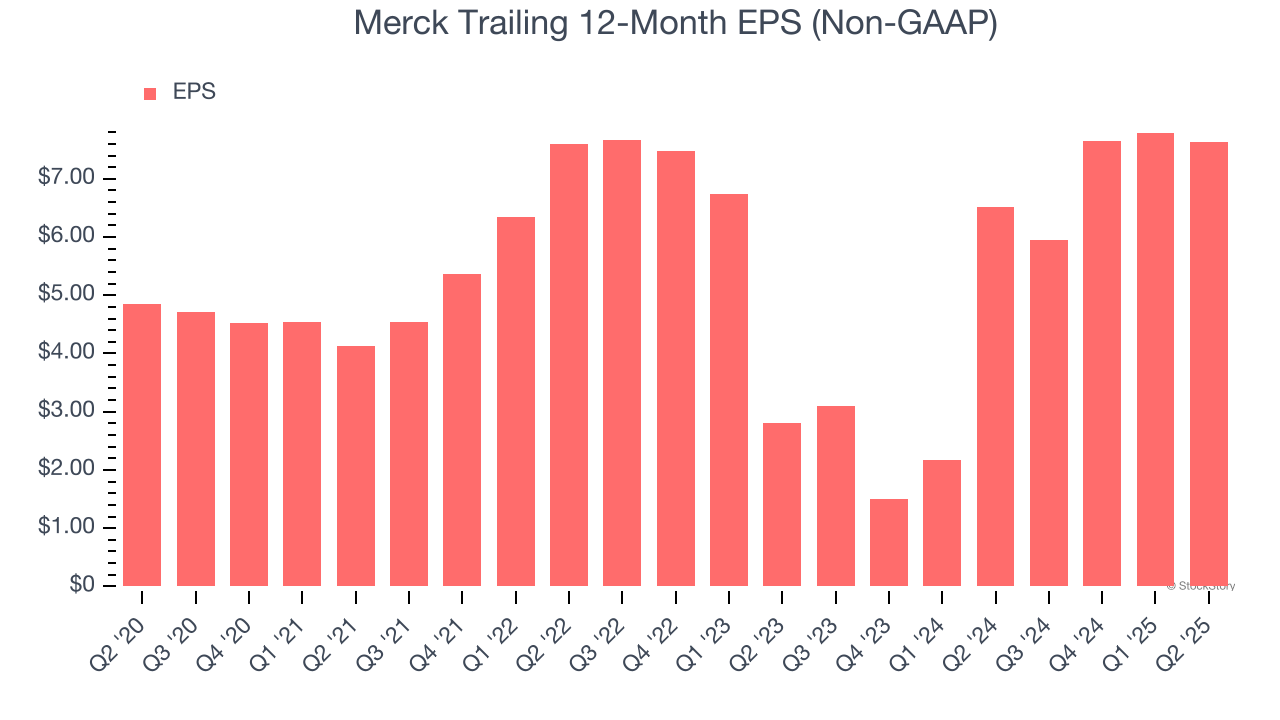
Diving into the nuances of Merck’s earnings can give us a better understanding of its performance. As we mentioned earlier, Merck’s operating margin declined this quarter but expanded by 13.3 percentage points over the last five years. This was the most relevant factor (aside from the revenue impact) behind its higher earnings; interest expenses and taxes can also affect EPS but don’t tell us as much about a company’s fundamentals.
In Q2, Merck reported EPS at $2.13, down from $2.28 in the same quarter last year. Despite falling year on year, this print beat analysts’ estimates by 5%. Over the next 12 months, Wall Street expects Merck’s full-year EPS of $7.64 to grow 20.2%.
Key Takeaways from Merck’s Q2 Results
Revenue was just in line and constant-currency revenue growth was negative, which isn't a great start. On the other hand, we liked that Merck beat Wall Street’s EPS estimates. Looking ahead, full-year EPS guidance exceeded estimates. Overall, this print was mixed. Investors were likely hoping for more, and shares traded down 2.6% to $81.91 immediately after reporting.
Big picture, is Merck a buy here and now? When making that decision, it’s important to consider its valuation, business qualities, as well as what has happened in the latest quarter. We cover that in our actionable full research report which you can read here, it’s free.
